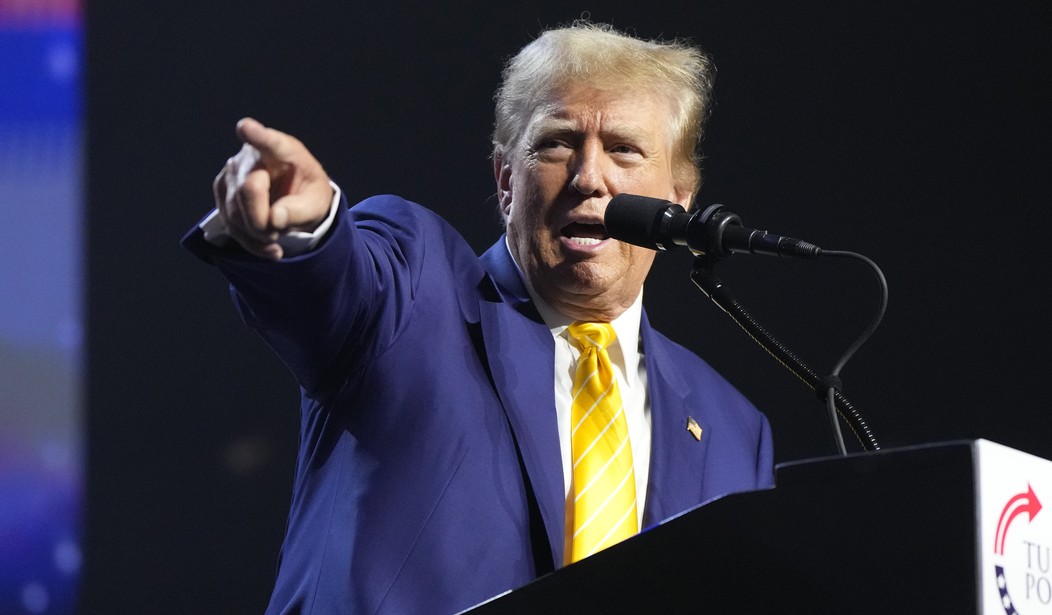Never let it be said that Donald Trump let the grass grow under his feet when opportunity arises. Just hours after the Supreme Court ruled on presidential immunity, Trump and his team filed a motion in Judge Juan Merchan's court to set aside his conviction on the basis of the decision.
Is this a PR strategy, a kitchen-sink strategy -- or a winning strategy?
Donald J. Trump began an effort on Monday to throw out his recent criminal conviction in Manhattan and postpone his upcoming sentencing, citing a new Supreme Court ruling that granted him broad immunity from prosecution for official actions he took as president, according to a person with knowledge of the matter. ...
The effort to set aside the conviction might be a long shot. The Manhattan case centers on acts Mr. Trump took as a candidate, not a president.
Yet his lawyers are likely to argue that prosecutors built their case partly on evidence from his time in the White House. And under the Supreme Court’s new ruling, prosecutors not only may not charge a president for any official acts, but also cannot cite evidence involving official acts to bolster other accusations.
At first blush, this looks more like a kitchen-sink or desperation strategy, for reasons I'll explain in a moment. It doesn't necessarily mean that it won't have an impact. In fact, the New York Times suggests it already has produced one change in the process, albeit a potentially minor one:
It is unclear how the Manhattan district attorney’s office, which brought the case, will respond, or whether the judge will delay the first sentencing of an American president. But Mr. Trump’s effort appeared to cause at least a brief interruption: The district attorney’s office did not on Monday make a sentencing recommendation to the judge about whether to imprison Mr. Trump, as was expected.
A spokeswoman for the district attorney’s office declined to comment.
I'd tend to think that this is correlative rather than causative. Whatever issues may be at play in Alvin Bragg's office, I doubt that presidential immunity would be among them. (See update below.)
Let's recap in brief what Trump v US establishes about presidential immunity. Roberts set up three classes of actions for scrutiny in immunity claims:
- official acts within the 'core' of a president's constitutional duties
- official acts outside of that narrower scope
- acts that have nothing to do with the office or its duties
Absolute immunity applies only to the first category, such as (in this instance) Trump's discussions with the Attorney General about election-fraud investigations. Presumptive immunity applies to all other official actions as president, over which courts have to hold an evidentiary hearing to determine whether individual acts are immune from prosecution. Motive can't play a role in that determination; the act itself has to be illegal on its face, not used as a building block to allege some other crime. (This may have a big impact on the RICO case in Georgia, if that ever gets to trial at all.)
On any other acts outside a president's execution of duties in office, though, anything goes. That would obviously include acts committed before taking office (or even being elected to it), such as the alleged payoff scheme to Stormy Daniels and the records manipulation to hide it. Even if Trump manipulated those records as president (they extended into his presidency), those are not official acts of the office; they are acts associated with Trump's private businesses.
It seems very clear that everything in the Manhattan case falls into the third bucket. It's not enough that some of the alleged acts took place while Trump was president -- and even if it did, Merchan would only need to vacate those counts specific to that time frame. To qualify for any consideration of immunity, the acts would have to be related to specific presidential duties. While that does apply in Georgia and the two Jack Smith trials-to-be, the Manhattan charges have nothing to do with presidential duties.
Thus, this motion will be easy for Merchan to dismiss, and there's absolutely no reason to think he'd be inclined to seriously consider it anyway. This motion is likely intended to set a marker for an appeal on the basis of immunity after the Supreme Court decision, but it's not likely to get much traction there either. That's all right, because there are plenty of better grounds on which to challenge this Frankenstein of a case by Bragg than on immunity. In that sense, it's a kitchen-sink strategy, as well as good for a short-term PR boost. But that's probably all of the mileage Trump will get out of the SCOTUS ruling in Manhattan.
Addendum. This will have one other salutary effect -- it will demonstrate the silliness of the hysteria over a fairly middle-of-the-road approach on presidential immunity taken by Roberts and the 6-3 majority.
Update: This does seem interesting, although perhaps not dispositive:
Manhattan prosecutors said they would be open to delaying Donald Trump’s sentencing in his criminal hush money case following a Supreme Court’s ruling that granted broad immunity protections to presidents.
In a letter filed Tuesday, prosecutors with the Manhattan District Attorney Alvin Bragg’s office said they would be open to delaying the July 11 sentencing for up to two weeks.
That would put sentencing -- and potential imprisonment -- off until after the convention. But just because Bragg's office doesn't oppose a delay doesn't mean that Merchan will agree to one, especially on the issue of an immunity doctrine that doesn't seem to apply to this case. Stay tuned.








Join the conversation as a VIP Member